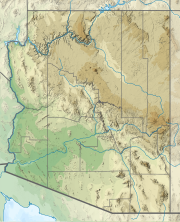| Mount Elden | |
|---|---|
 Mount Elden | |
| Highest point | |
| Elevation | 9,301 ft (2,835 m) NAVD 88[1] |
| Prominence | 1,219 ft (372 m)[2] |
| Coordinates | 35°14′28″N 111°35′51″W / 35.241034303°N 111.597552792°W[1] |
| Geography | |
| Location | Coconino County, Arizona, U.S. |
| Topo map | USGS Flagstaff East |
| Geology | |
| Mountain type | lava dome |
| Volcanic field | San Francisco volcanic field |
| Climbing | |
| Easiest route | road |
Mount Elden or Elden Mountain (Hopi: Hovi'itstuyqa) is located in central Coconino County northeast of Flagstaff, Arizona. It takes its name from one of the region's earliest Anglo settlers, John Elden, who, along with his family, established a homestead on the mountain's lower slopes and grazed sheep on the open grasslands below during the late 19th century.[3]
The mountain's exposed, rocky slopes are a dominant feature from almost any part of the city of Flagstaff, rising steeply nearly 2,400 feet (730 m) to an elevation of 9,301 feet (2,835 m). Much of the vegetation on the southern and southeastern slopes of the mountain was destroyed by the human-caused Radio Fire in 1977 which burned 4,600 acres (1,900 ha).[4]
Despite its rugged appearance, steep relief, and nearly 15 square miles (40 km2) of surface area,[5] Mount Elden is easily accessible via an extensive, well-developed road and non-motorized trail system that is part of the Coconino National Forest.
Mount Elden is one of six hundred volcanoes that dot the San Francisco volcanic field in Northern Arizona. It is currently dormant with the likelihood of eruption in the near future being believed to be extremely remote.[6]
- ^ a b "Elden". NGS Data Sheet. National Geodetic Survey, National Oceanic and Atmospheric Administration, United States Department of Commerce. Retrieved 2014-02-06.
- ^ "Elden Mountain, Arizona". Peakbagger.com. Retrieved 2014-02-06.
- ^ Cline, Platt (1976). They came to the mountain: the story of Flagstaff's beginnings. Flagstaff: Northern Arizona University. p. 210. ISBN 0-87358-153-9.
- ^ Ashworth, Donna (1991). Biography of a Small Mountain. Flagstaff: Small Mountain Books. p. 347. ISBN 978-0963036438.
- ^ Kluth, Charles (1974). Geology of the Elden Mountain Area, Coconino County, Arizona (M.S). Flagstaff: Northern Arizona University. OCLC 27667856.
- ^ Clark, Makayla (Dec 2, 2018). "Volcanic field around Flagstaff remains a moderate threat | News | jackcentral.org". The Lumberjack.
